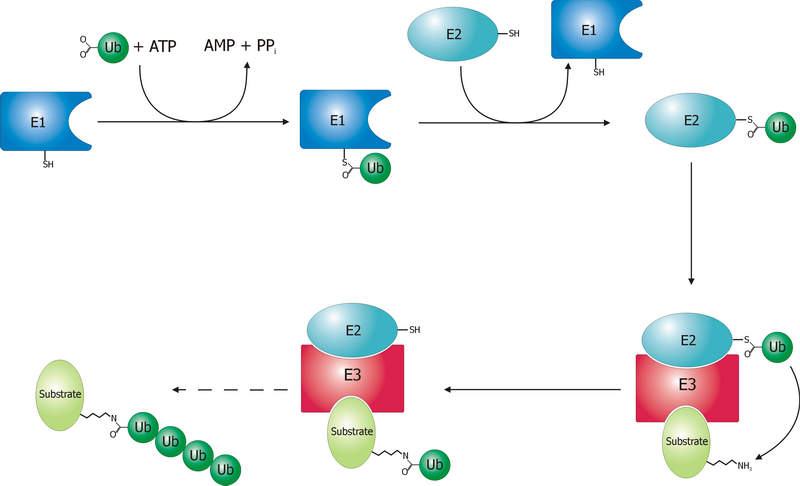Ubiquitin-conjugating enzyme
 Ubiquitin-conjugating enzyme (E2) is a critical enzyme in the ubiquitination process, which tags proteins for proteasomal degradation, DNA repair, cell cycle control, and transcriptional regulation. Ubiquitination is a post-translational modification process that involves the attachment of ubiquitin, a small regulatory protein, to a substrate protein. This process is essential for maintaining cellular homeostasis and is implicated in the regulation of various cellular processes and diseases.
Ubiquitin-conjugating enzyme (E2) is a critical enzyme in the ubiquitination process, which tags proteins for proteasomal degradation, DNA repair, cell cycle control, and transcriptional regulation. Ubiquitination is a post-translational modification process that involves the attachment of ubiquitin, a small regulatory protein, to a substrate protein. This process is essential for maintaining cellular homeostasis and is implicated in the regulation of various cellular processes and diseases.
Function[edit | edit source]
The ubiquitin-conjugating enzyme plays a pivotal role in the second step of the ubiquitination cascade. The ubiquitination process involves three main types of enzymes: E1 ubiquitin-activating enzyme, E2 ubiquitin-conjugating enzyme, and E3 ubiquitin ligase. Initially, the E1 enzyme activates ubiquitin in an ATP-dependent manner and transfers it to the E2 enzyme. Subsequently, the E2 enzyme, often in conjunction with an E3 ligase, facilitates the transfer of ubiquitin to the target substrate protein. The specificity of the ubiquitination process, including the selection of substrate proteins and the type of ubiquitin linkage formed, is largely determined by the E3 ligase. However, E2 enzymes also play a significant role in determining the outcome of ubiquitination, influencing processes such as protein degradation, signaling pathways, and cellular localization.
Classification[edit | edit source]
Ubiquitin-conjugating enzymes are classified into several families based on sequence homology and functional similarities. Each family is associated with specific cellular processes and E3 ligases. The diversity among E2 enzymes allows for the specificity and regulation of ubiquitination in various cellular contexts.
Clinical Significance[edit | edit source]
Alterations in the function or expression of E2 enzymes have been linked to several diseases, including cancer, neurodegenerative diseases, and infectious diseases. For instance, dysregulation of ubiquitin-conjugating enzymes can lead to the aberrant degradation of tumor suppressor proteins or the stabilization of oncoproteins, contributing to the development and progression of cancer. Therefore, understanding the mechanisms of E2 enzymes and their interactions with E3 ligases offers potential therapeutic targets for drug development.
Research[edit | edit source]
Ongoing research aims to elucidate the detailed mechanisms of E2 enzymes in ubiquitination, including their specificity, interaction with E3 ligases, and role in cellular processes. Structural and biochemical studies are crucial for understanding the complex regulation of ubiquitination and for the development of inhibitors that can modulate the activity of specific E2 enzymes for therapeutic purposes.
Search WikiMD
Ad.Tired of being Overweight? Try W8MD's physician weight loss program.
Semaglutide (Ozempic / Wegovy and Tirzepatide (Mounjaro / Zepbound) available.
Advertise on WikiMD
|
WikiMD's Wellness Encyclopedia |
| Let Food Be Thy Medicine Medicine Thy Food - Hippocrates |
Translate this page: - East Asian
中文,
日本,
한국어,
South Asian
हिन्दी,
தமிழ்,
తెలుగు,
Urdu,
ಕನ್ನಡ,
Southeast Asian
Indonesian,
Vietnamese,
Thai,
မြန်မာဘာသာ,
বাংলা
European
español,
Deutsch,
français,
Greek,
português do Brasil,
polski,
română,
русский,
Nederlands,
norsk,
svenska,
suomi,
Italian
Middle Eastern & African
عربى,
Turkish,
Persian,
Hebrew,
Afrikaans,
isiZulu,
Kiswahili,
Other
Bulgarian,
Hungarian,
Czech,
Swedish,
മലയാളം,
मराठी,
ਪੰਜਾਬੀ,
ગુજરાતી,
Portuguese,
Ukrainian
Medical Disclaimer: WikiMD is not a substitute for professional medical advice. The information on WikiMD is provided as an information resource only, may be incorrect, outdated or misleading, and is not to be used or relied on for any diagnostic or treatment purposes. Please consult your health care provider before making any healthcare decisions or for guidance about a specific medical condition. WikiMD expressly disclaims responsibility, and shall have no liability, for any damages, loss, injury, or liability whatsoever suffered as a result of your reliance on the information contained in this site. By visiting this site you agree to the foregoing terms and conditions, which may from time to time be changed or supplemented by WikiMD. If you do not agree to the foregoing terms and conditions, you should not enter or use this site. See full disclaimer.
Credits:Most images are courtesy of Wikimedia commons, and templates, categories Wikipedia, licensed under CC BY SA or similar.
Contributors: Prab R. Tumpati, MD
